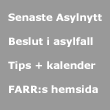ASYLNYTT
Sponsrad av Fridh Advokatbyrå
ARKIV:
EU:s flykting- och gränspolitik
Allmänt om migration, statistik

Asylnytt - Arkiv
Flyktinggrupper från olika länder, praxis
Afrika
Information från myndigheter och organisationer
Pressklipp saknas
Arkiveringsdatum 210125:
UNHCR 21-01-22:
Nordafrika/ Grim milestone as Sahel violence displaces 2 million inside their countries
UNHCR, the UN Refugee Agency, is calling for an end to the unrelenting violence in Africa's Sahel which has now displaced more than two million people within the borders of their countries for the first time ever.
The Sahel - which includes Burkina Faso, Chad, Mali, and Niger - is home to some of the world's least developed countries, and the communities hosting the displaced have reached a breaking point.
Needs are surging across a region where multiple crises converge including armed conflict, extreme poverty, food insecurity, climatic changes, and the COVID-19 pandemic.
The extreme vulnerability of the Sahel has been laid bare by the impact of forced displacement, caused by widespread and gruesome violence perpetrated by armed insurgent groups and criminal gangs.
The humanitarian response is dangerously overstretched, and UNHCR is urging the international community to redouble its support for the region. States must act now to help Sahel countries address the root causes of this forced displacement, to boost strategic and sustainable development, and to strengthen institutions such as schools and hospitals, many of which have shut due to ongoing violence. The situation has worsened due to the COVID-19 pandemic.
Internal displacement in the region has quadrupled in just two years, as there were 490,000 internally displaced people (IDPs) at the beginning of 2019. More than half of the IDPs in the region are Burkinabé. The Sahel also hosts over 850,000 refugees, mainly from Mali.
Already this year, violence in Niger and Burkina Faso has forced more than 21,000 people to flee their homes and seek refuge within their own countries.
(...)
Hela artikeln (Extern länk)
Se även:
UNHCR 21-01-22: Over 100,000 displaced by resurgence of violence in Sudan's Darfur region (Extern länk)
Arkiveringsdatum 200208:
The Nordic Africa Institute 20-02- 07:
Afrika/ Shifting the narrative on African migration
The numbers, the root causes, the alternatives - get them right!
Jesper Bjarnesen
The overall message of this policy note is that negative public opinion in Europe is a major obstacle to holistic and sustainable policies relating to African migration. It argues for a shift in wording and perspective away from politicised opinions about immigration, or misplaced ideas of humanitarian responsibilities, towards a more constructive and pragmatic focus on labour migration management.
African migration remains at the top of political agendas across Europe. Through the EU-led focus on addressing the "root causes" of African migration, and the UN-led Global Compact for Safe, Orderly and Regular Migration (GCM), African migration is increasingly being linked to sustainable development. It has proven difficult, however, to mobilise support for longer-term policy solutions, and the lion's share of European funding still targets border-control measures and the repatriation of African migrants from Europe. The main challenge facing European decision makers and policy implementers in this regard is not lack of ideas - there are plenty of good policy ideas in the UN GCM, in the EU Agenda on Migration, and in a host of national political agendas. The main stumbling block of these initiatives is the negative public opinion towards African migration, which stems from a fear of unregulated immigration to Europe and a new "refugee crisis". By shifting the narrative on African migration, decision makers can redirect political will towards more sustainable and longer-term solutions to the problems relating to irregular migration from Africa. Such a shift would also harness the untapped potential of South- North migration to meet the needs of host countries' domestic labour markets, while simultaneously serving the interests of migrants and their home communities.
Hämta rapporten (Extern länk)
Källor: Informationen på denna sida är hämtad från följande källor (externa länkar): EU (kommissionen, ministerrådet, parlamentet och domstolen), Europarådet (mr-kommissionären, domstolen, kommittén mot tortyr), FN:s flyktingkommissariat UNHCR, FN:s kommitté mot tortyr m.fl. FN-organ, Sveriges Radio, SvT, andra svenska media via Nyhetsfilter och pressmeddelanden via Newsdesk, utländska media till exempel via Are You Syrious och Rights in Exile, internationella organisationer som Amnesty International, Human Rights Watch, ECRE, Statewatch och Picum, organisationer i Sverige som Rädda Barnen, Asylrättscentrum, Svenska Amnesty, FARR och #vistårinteut samt myndigheter och politiska organ som Migrationsverket, Sveriges domstolar, JO, Justitiedepartementet m.fl. departement och Sveriges Riksdag.
Bevakning: Hjalte Lagercrantz och Sanna Vestin. Sammanställning: Sanna Vestin. Asylnytt är ett ideellt projekt. Sponsring avser prenumerationsavgifter. Tips emottages tacksamt.

 innehåll
innehåll